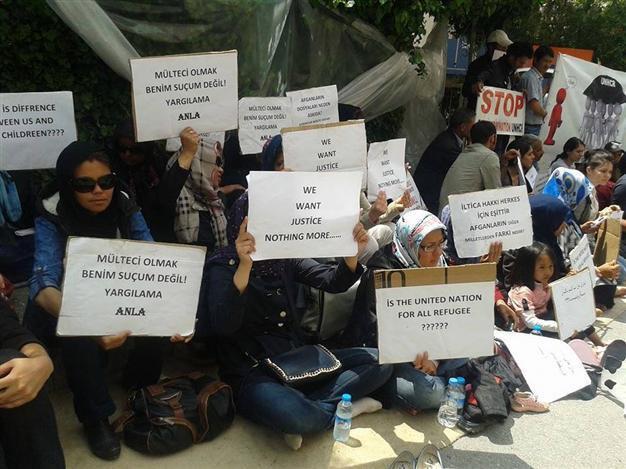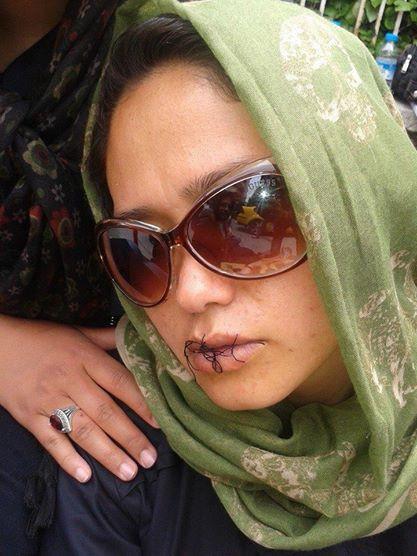With mouths sewn shut, Afghan refugees keep protesting Ankara, UNHCR
Özgün Özçer ISTANBUL

Afghan refugees in Turkey have entered their seventh week of protests, some with sewn mouths, demanding equal and fair treatment in their application procedure. Photo courtesy of Facebook page in support of Afghan refugees
Afghan refugees in Turkey have entered their seventh week of protests, demanding equal and fair treatment in their application procedure, as they struggle to make their voices heard amid indifference and growing pressure from authorities.
Some 100 Afghans – half of them women and children – are camping day and night in front of the headquarters of the U.N.’s refugee agency (UNHCR) in Ankara, braving threats from the police, including six refugees who have been engaged in a hunger strike for one week, sewing their mouths and refusing water, as well as food.
One of the Afghan protesters, Farzad Shafahi, said U.N. officials have suspended all their asylum applications on the grounds that third-countries did not want to accept refugees from Afghanistan.
“They told us that even if we die, nothing is going to change. And they would particularly not do anything as long as we continue our hunger strike; that it will be allowing a gap of authority and everybody would start to do the same. So we asked, ‘If we leave tonight, would you answer our plea?’ They didn’t respond,” Shafahi told Hürriyet Daily News.
Shafahi, 24, has been waiting for over two years for an answer to his application, but says there are Afghan refugees who have waited for five and even eight years – while the procedure only takes an average of a year for other asylum-seekers.
“The last time I called, the person asked if I was an Afghan, then said ‘your applications have been suspended’ and hung up,” Shafahi said.
“They say the host countries’ quotas are full and they don’t want Afghans, preferring refugees from other countries. One official even said there has been a refugee inflow from Afghanistan for 40 years, while Syrians were now ‘more attractive.’ We told them that we knew all that, and we were precisely here to change it,” said Shafahi, adding that in the three meetings they held, U.N. officials did not even admit them inside the main building. He also explained that host countries were shifting responsibility to the UNHCR.
“We wrote to some of those countries. They told us that they were not committing discrimination, but the UNHCR was not sending the Afghans’ applications,” he said.
Shafahi also denounced the attitudes of the UNHCR officials who told police to prevent them from camping in front of the building, did not call ambulances when hunger strikers fainted and even suggested them to take illegal roads to reach Europe.
Risk of deportation
Around 30,000 Afghan asylum-seekers are granted a temporary protection status in Turkey during the review of their asylum applications to the UNHCR, a situation that condemns them to precarity, as they are not allowed to work according to Turkish legislation. Most of them are sent to “satellite towns” far from the big cities and are required to sign a paper at the police post three times a week.

Six refugees have been engaged in a hunger strike for more than one week, sewing their mouths
Due to geographic restrictions in its legislation, Turkey does not give asylum to refugees entering from its eastern borders. The confusion regarding the share of competence between a recently established immigration administration, connected to the Interior Ministry, and the UNHCR adds more uncertainty to the future of Afghan refugees.
Shafahi said refugees were not only taking big risk, as they can legally be deported if they miss checking in at the police post of their host cities for five weeks, but they have also been openly threatened to be deported.
“A chief at the foreigners’ department said if we continued camping there, he would pay for two flights from his own pockets to send us directly to Kabul. He said Turkey is ‘not a state that would not be able to handle 200-400 Afghans,’” he said.
Shafahi said police had already stormed the camp nearby the UNHCR headquarters at the end of April, beating women and children alike, as they were forming human chains.
“Some had broken noses, one person had a dislocated shoulder,” said Shafahi, adding they were then sent back to satellite towns – however, to the wrong ones. A person living in Kayseri was sent to Konya, while one in the Central Anatolian town of Nevşehir ended up over 1,000 kilometers further east in Mardin.
Shafahi said the protests were neither organized nor had a leader, with families coming and going as they wish or “feel the need to take a shower,” and new refugees launching new hunger strikes were taking over from others, who were force-fed when brought to the hospital. He warns that many now only want to die.
“Our demands are not illogical. I am not asking to be sent to the U.S. on the first flight available. I just expect the same treatment other migrants receive,” Shafahi said.
Although their most important support has been the locals at the Ankara neighborhood of Sancak, their resources are becoming scarce. Solidarity groups have appealed to send food and blankets, while an
online petition campaign has been launched on change.org to spread their demands.
According to claims, one of the reasons for the reluctance of officials to give Afghans asylum status is the presence of 2 million Afghan refugees in Iran. Some think hastening the asylum procedures would open the way for refugees in Iran to seek asylum via Turkey.
But Shafahi says Afghans do not accept being the forgotten refugees of Turkey and the disdained asylum-seekers of the world.
“Are we going to stay refugees forever?” he asked.

